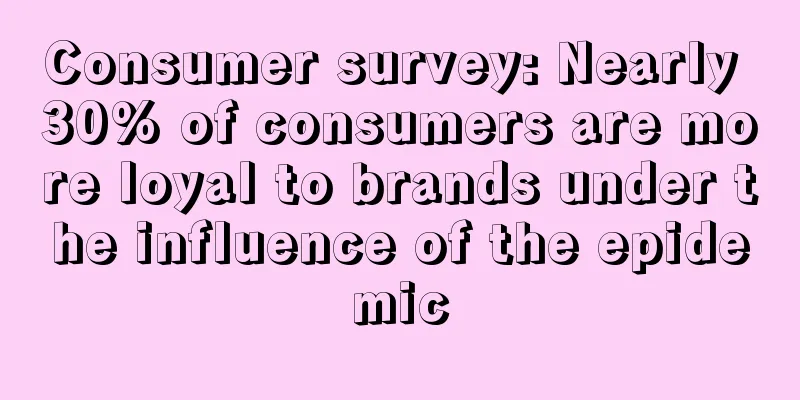Consumer survey: Nearly 30% of consumers are more loyal to brands under the influence of the epidemic

|
Yotpo surveyed 3,800 consumers in the U.S., U.K. and Australia last year, spanning Gen Z, Millennials, Gen X and Baby Boomers. Survey data shows that consumer loyalty changes are actually on the rise under the influence of COVID-19. Here are some of the main findings. 1. Respondents are more brand loyal
When asked about the changes in their brand loyalty compared to 2019, 26.4% of respondents chose "more", while the number of respondents who chose "less" remained stable at around 13%. 2. The increase in brand loyalty is attributed to the impact of COVID-19
COVID-19 has had a significant impact on consumer loyalty and purchasing behavior . Nearly 30% of respondents ( and 36.3% of Gen Z ) said they are more loyal to brands during this difficult time to help and support them. Compared to the past, consumers now view their relationship with brands not just as a transactional exchange , but have more emotional investment in the brands they like and are more likely to spend more on their favorite brands . 3. Respondents are loyal to more brands
The proportion of respondents who are completely unloyal to a brand dropped from 5.6% to 2.7%, and the proportion of respondents who are loyal to 1-5 brands dropped from 59.7% to 54.7%. The proportion of respondents loyal to 6 to 10 brands increased from 26% to 31.1%, while the proportion of respondents loyal to 11 to 20 brands (6.2% to 8%) and 20+ brands (2.5% to 3.6%) also increased. 4. What would respondents do for a brand they are loyal to?
When asked what actions they would be willing to take for a brand they are loyal to, nearly 68% of 2020 respondents said they would join a brand’s loyalty / VIP program, up from 59.8% in 2019. Likewise, those willing to spend more on a brand if a cheaper alternative existed surged from 34.5% in 2019 to 56% in 2020. 5. How brands can cultivate customer loyalty
First, as many as 84.3% of respondents prefer to be loyal to brands that are consistent with their values, so brands can convey their brand voice and values in a variety of ways .
Secondly, as can be seen from the above figure, "getting sales first" (42% to 60.1%) and "getting new products first" (30.3% to 50.8%) have both increased significantly, and "tailored offers and suggestions" have also increased from 32.7% to 38.9%. Sellers can also add the above elements when formulating loyalty programs. In summary, the increase in customer loyalty during the epidemic is welcomed by sellers, but it is also undeniable that consumers face more shopping options. In 2021, sellers should focus on building their core competitiveness and continue to establish emotional connections with customers. Customer Loyalty brand epidemic |
Recommend
What is huaxizi? huaxizi Review, Features
The huaxizi brand was born in Hangzhou, China in 2...
The sleep-aid economy is booming, and British mattress brands have achieved positive revenue growth for three consecutive years
According to foreign media reports, not long ago,...
69% of Austrians shop online between 6pm and 11pm
According to a recent study by KPMG, half of Aust...
What is Biblio? Biblio Review, Features
Biblio was founded in 2003 as a second-hand book ...
What is ISBN? ISBN Review, Features
ISBN stands for International Standard Book Numbe...
Are you having trouble with overseas marketing? 70 pages of charts and data will help you solve your problems
Why are you not doing well in overseas marketing?...
What is Pavol International Warehousing? Pavol International Warehousing Review, Features
Shenzhen Pavol International Warehousing Service C...
What is Magic Word Appeal? Magic Word Appeal Review, Features
Moci Appeal (Hangzhou Aosheng Trading Co., Ltd.) ...
Amazon launches new features, sellers' sales to increase
Recently, sales on Amazon have been fluctuating. ...
What is FlexiSpot? FlexiSpot Review, Features
FlexiSpot is an international company that sells d...
Amazon plans to close five fulfillment centers in Massachusetts
According to foreign media reports, Amazon announ...
What is nocnocstore? nocnocstore Review, Features
nocnocstore is a Uruguayan cross-border e-commerce...
Sales surged 5107%! Posture correction chairs are a big hit in Korea
It is reported that as of February 22, there were...
How much is the operation shortage? Received 121 HR messages in one hour
A fierce battle for operations is underway in the...
The opportunity has come! Top sellers crack the dark horse of traffic
With the wave of going overseas, how to seek new ...









